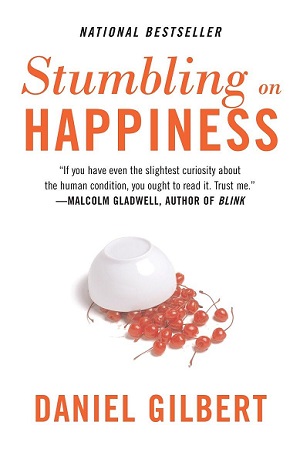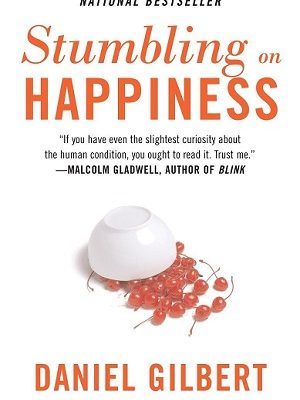Stumbling on Happiness by Daniel Gilbert explores the complexities of human happiness, focusing on how people attempt to predict and achieve happiness and why these attempts often fall short. The book is grounded in psychology and cognitive science, offering profound insights into human behavior and happiness. Below are 17 lessons from the book:

Read: Finding Your Element
1. We Are Poor at Predicting What Will Make Us Happy
- Gilbert argues that humans are not as adept at predicting their future happiness as they believe. This concept, known as affective forecasting, shows that when we imagine how future events will make us feel, we tend to overestimate both the intensity and duration of our emotional reactions. Whether anticipating joy from a promotion or despair from a breakup, we are often wrong about how happy or unhappy these events will make us.
2. The Illusion of Control
- People often believe that having control over events leads to greater happiness. However, Gilbert reveals that the sense of control is often an illusion. Many external factors that influence happiness are beyond our control, and our perceived ability to influence them can lead to misguided decisions. Recognizing that not everything is within our control can help alleviate anxiety and disappointment when things don’t go as planned.
3. The Role of Memory in Shaping Future Expectations
- Memory plays a crucial role in how we perceive future happiness. Unfortunately, memory is not always reliable. Gilbert explains that our recollection of past events is often distorted, with negative memories either fading or becoming more positive over time. This distorted memory affects our expectations of future happiness, leading us to believe that certain experiences will repeat in the same way.
4. Present Bias: Overvaluing Immediate Gratification
- Present bias is the tendency to prioritize immediate rewards over long-term benefits. Gilbert explains that humans are wired to focus on short-term happiness, often at the expense of long-term fulfillment. This lesson is essential for understanding why people make choices that lead to temporary satisfaction rather than lasting joy, such as impulsive purchases or procrastination.
5. Impact Bias: Overestimating the Emotional Impact of Future Events
- Another key lesson is impact bias, where individuals overestimate the emotional impact of future events. Whether it’s the excitement of buying a new car or the dread of losing a job, people tend to think these events will affect their happiness more than they actually do. Gilbert encourages readers to recognize this bias and not put too much stock in anticipated emotional reactions.
6. Adaptation and the Hedonic Treadmill
- Humans have an incredible ability to adapt to both positive and negative changes in their lives. This hedonic adaptation means that after an initial spike in happiness from positive events (like buying a house or getting married), we quickly return to a baseline level of happiness. Similarly, negative events may cause temporary unhappiness, but over time, we adapt and return to our baseline. This explains why material possessions or external achievements often don’t lead to lasting happiness.
7. Comparative Happiness: The Danger of Social Comparison
- Gilbert highlights the importance of social comparison in shaping our happiness. People tend to measure their happiness relative to others, which can lead to dissatisfaction. For example, getting a raise may feel less satisfying if you know your colleague received a bigger one. The lesson here is that focusing on your own life and achievements, rather than constantly comparing yourself to others, can significantly improve happiness.
8. Imagination’s Role in Happiness
- Our imagination is often flawed when it comes to predicting future happiness. Gilbert explains that we imagine future events based on how we feel in the present, which can distort reality. For instance, when we are hungry, we may imagine that food will make us happier than it actually will, leading to overeating or poor decisions. Learning to separate current feelings from future expectations can help in making better choices.
9. Happiness Comes More from Experiences Than Possessions
- One of the key insights of the book is that experiences tend to bring more lasting happiness than material possessions. Experiences, like travel or spending time with loved ones, create lasting memories and emotional connections. Meanwhile, material items, such as gadgets or clothing, lose their novelty and do not lead to long-term fulfillment. Investing in experiences rather than possessions can boost happiness in the long run.
10. Our Minds Focus on the Differences
- The human brain is wired to focus on differences and changes, which affects how we experience happiness. Gilbert explains that when we experience something new, it brings us joy because it is different from what we are used to. However, as we become accustomed to it, the differences fade, and so does our happiness. This lesson highlights why novelty can be exciting but also short-lived in contributing to long-term happiness.
11. The Endowment Effect and Attachment
- The endowment effect is the psychological phenomenon where people value things they own more than things they do not. This attachment to possessions or relationships often clouds judgment, making it difficult to let go of things that may no longer serve us. Understanding this cognitive bias can help individuals make more rational decisions, focusing on what truly brings happiness rather than clinging to past attachments.
12. Happiness and the Pursuit of Meaning
- Gilbert discusses the relationship between happiness and meaning, arguing that true happiness often comes from a sense of purpose or meaningful engagement with life, rather than mere pleasure. While pleasurable activities provide temporary happiness, long-term fulfillment often stems from meaningful work, relationships, and contributions to society.
13. Embracing Uncertainty
- Uncertainty can often lead to anxiety, but Gilbert suggests that embracing the unknown can actually enhance happiness. People often seek certainty in life decisions, but an openness to unpredictability and change allows for new experiences and opportunities that can lead to greater happiness. Being flexible and adaptive in the face of uncertainty can lead to more satisfying outcomes.
14. The Power of Relationships in Happiness
- One of the most powerful lessons from the book is that relationships are a key determinant of happiness. Gilbert emphasizes that the quality of our connections with others plays a significant role in how happy we feel. People who invest in strong relationships with family, friends, and communities often experience greater long-term happiness than those who focus solely on individual success.
15. Regret and Counterfactual Thinking
- Gilbert discusses how regret and counterfactual thinking (thinking about what might have been) can distort our happiness. People often dwell on missed opportunities or past mistakes, which undermines their current well-being. Learning to let go of the past and focusing on the present is a crucial lesson for cultivating happiness.
16. Happiness is Subjective
- Gilbert emphasizes that happiness is a subjective experience, meaning that what makes one person happy may not necessarily make another happy. Personal preferences, cultural influences, and individual experiences shape our definitions of happiness. This lesson teaches the importance of understanding what uniquely brings you joy rather than adhering to societal standards of happiness.
17. We Are More Resilient Than We Think
- A key lesson from Gilbert’s research is that people are more resilient than they give themselves credit for. When imagining future challenges, people tend to think they will be more negatively affected than they actually will be. However, humans have a remarkable ability to cope and recover from difficult situations. This lesson encourages readers to trust in their ability to overcome adversity.
Conclusion:
Daniel Gilbert’s Stumbling on Happiness provides a deep exploration of why humans struggle to accurately predict and achieve happiness. Through understanding cognitive biases like affective forecasting, impact bias, and the hedonic treadmill, readers can begin to navigate their own pursuit of happiness more effectively. The book challenges common assumptions about happiness and encourages readers to embrace uncertainty, invest in experiences over possessions, and build meaningful relationships (Amazon).



